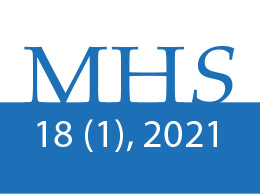Effectiveness of Augmented Feedback on Motor Skills Performance: A Meta-Analysis
DOI:
https://doi.org/10.15359/mhs.18-1.2Keywords:
extrinsic feedback, knowledge of results, knowledge of performance, motor learning, skill acquisitionAbstract
The purpose of this study was to use the meta-analytic approach to assess the effectiveness of augmented feedback (AF) on performance and learning of motor skills. Studies were retrieved by searching electronic databases, cross refereeing, and expert criteria. Studies were selected and data was extracted by the three authors independently. The quality of the studies was measured by a modify TEXTEX scale. Random effects models using the standardized mean difference effect size (ES) were used to pool results. Risk of bias, heterogeneity, and inconsistency was examined. Twenty studies met the inclusion criteria. A total of 95 ESs were calculated, representing 949 participants. During physical practice, performance increases from pretest to acquisition when receiving AF (ES = 0.87; 95%CI = 0.65, 1.10; n = 47; I2. = 74.41; Q= 183,6; p < 0.01); while performance significantly decrease between the acquisition and retention phase after AF was removed (ES = -0.74; 95%CI = -1.04, -0.44; n = 45; I2. = 88.34; Q = 377.45; p < 0.01). Age and skill level ability of the participants, type of task, and practice characteristics, and type of feedback were analyzed as potentially moderator variables. Results suggest that AF increases performance in motor skills during physical practice, but performance decreases after removing AF in retention; all due, AF enhances learning of motor skills.
References
Ahulló, A. M., Massó, X. G., Osa, C. G., Torres, I. E., & de Valencia, U. (2019). Influencia del tipo de feedback utilizado en el aprendizaje de una tarea motriz de equilibrio Influence of the type of feedback on balance motor tasks learning. Retos. Nuevas tendencias en Educación Física, Deportes y Recreación, 36, 435-440.
*Ahmadi, P., Sabzi, A. H., Heirani, A., & Hasanvand, B. (2011). The effect of feedback after good, poor, good-poor trials, and self-control conditions in an acquisition and learning of force production task. Facta Universitatis: Series Physical Education & Sport, 9(1), 35–43.
Anderson, D., Magill, R. A., Sekiya, H., & Ryan, G. (2005). Support for an explanation of the guidance effect in motor skill learning. Journal of Motor Behavior, 37(3), 231-238. Scopus. https://doi.org/10.3200/JMBR.37.3.231-238
Bechtel, N. T., McGee, H. M., Huitema, B. E., & Dickinson, A. M. (2015). The Effects of the Temporal Placement of Feedback on Performance. Psychological Record, 65(3), 425–434. https://doi.org/10.1007/s40732-015-0117-4
Beltrão, N. B., Henrique, R. S., Siqueira, A. K. M., Santos, J. N. C., Mello, A. M. S..., & Cattuzzo, M. T. (2011). Precisão de conhecimento de resultados na aprendizagem motora em crianças e adultos. / The effect of level of knowledge accuracy of results on learning of motor skills in children and adults. Motricidade, 7(3), 69–77. https://doi.org/10.6063/motricidade.7(3).104
Borenstein, M., Hedges, L. V., Higgins, J. P., & Rothstein, H. R. (2009). Introduction to meta-analysis. John Wiley & Sons. https://doi.org/10.1002/9780470743386
Borenstein, M., Higgins, J. P. T., Hedges, L. V., & Rothstein, H. R. (2017). Basics of meta-analysis: I 2 is not an absolute measure of heterogeneity: I 2 is not an absolute measure of heterogeneity. Research Synthesis Methods, 8(1), 5–18. https://doi.org/10.1002/jrsm.1230
*Burtner, P. A., Leinwand, R., Sullivan, K. J., Goh, H.-T., & Kantak, S. S. (2014). Motor learning in children with hemiplegic cerebral palsy: Feedback effects on skill acquisition. Developmental Medicine and Child Neurology, 56(3), 259–266. https://doi.org/10.1111/dmcn.12364
Cattuzzo, M. T., Dos Santos Henrique, R., Ré, A. H. N., de Oliveira, I. S., Melo, B. M., de Sousa Moura, M., de Araújo, R. C., & Stodden, D. (2016). Motor competence and health related physical fitness in youth: A systematic review. Journal of Science and Medicine in Sport, 19(2), 123-129. https://doi.org/10.1016/j.jsams.2014.12.004
*Cohen, R., Goodway, J. D., & Lidor, R. (2012). The effectiveness of aligned developmental feedback on the overhand throw in third-grade students. Physical Education & Sport Pedagogy, 17(5), 525–541. https://doi.org/10.1080/17408989.2011.623230
Coker, C. A. (2004). Motor learning and control for practitioners. McGraw-Hill Humanities/Social Sciences/Languages.
*Cuppone, A. V., Squeri, V., Semprini, M., Masia, L., & Konczak, J. (2016). Robot-assisted proprioceptive training with added vibro-tactile feedback enhances somatosensory and motor performance. Plos One, 11(10), e0164511–e0164511. https://doi.org/10.1371/journal.pone.0164511
Ericsson, I. (2008). Motor skills, attention and academic achievements. An intervention study in school years 1-3. British Educational Research Journal, 34(3), 301–313. https://doi.org/10.1080/01411920701609299
Fairbrother, J. T. (2010). Fundamentals of Motor Behavior. Human Kinetics.
*Goodwin, J. E., & Goggin, N. L. (2018). An older adult study of concurrent visual feedback in learning continuous balance. Perceptual and Motor Skills, 125(6), 1160–1172. https://doi.org/10.1177/0031512518795758
*Hansen, S., Pfeiffer, J., & Patterson, J. T. (2011). Self-control of feedback during motor learning: Accounting for the absolute amount of feedback using a yoked group with self-control over feedback. Journal of Motor Behavior, 43(2), 113–119. https://doi.org/10.1080/00222895.2010.548421
Higgins, J. P., Thompson, S. G., Deeks, J. J., & Altman, D. G. (2003). Measuring inconsistency in meta-analyses. Bmj, 327(7414), 557–560. https://doi.org/10.1136/bmj.327.7414.557
Hinder, M. R., Tresilian, J. R., Riek, S., & Carson, R. G. (2008). The contribution of visual feedback to visuomotor adaptation: How much and when? Brain Research, 1197, 123–134. https://doi.org/10.1016/j.brainres.2007.12.067
*Hoff, M., Kaminski, E., Rjosk, V., Sehm, B., Steele, C. J., Villringer, A., & Ragert, P. (2015). Augmenting mirror visual feedback-induced performance improvements in older adults. European Journal of Neuroscience, 41(11), 1475–1483. https://doi.org/10.1111/ejn.12899
Ives, J. C. (2014). Motor Behavior: Connecting Mind and Body for Optimal Performance. Lippincott Williams & Wilkins.
*Kernodle, M. W., & Carlton, L. G. (1992). Information feedback and the learning of multiple-degree-of-freedom activities. Journal of Motor Behavior, 24(2), 187–195. https://doi.org/10.1080/00222895.1992.9941614
*Kim, Y., Kim, J., Kim, H., Kwon, M., Lee, M., & Park, S. (2019). Neural mechanism underlying self-controlled feedback on motor skill learning. Human Movement Science, 66, 198–208. https://doi.org/10.1016/j.humov.2019.04.009
*Krause, D., Brüne, A., Fritz, S., Kramer, P., Meisterjahn, P., Schneider, M., & Sperber, A. (2014). Learning of a golf putting task with varying contextual interference levels induced by feedback schedule in novices and experts. Perceptual and Motor Skills, 118(2), 384–399. https://doi.org/10.2466/23.30.PMS.118k17w3
Lauber, B., & Keller, M. (2014). Improving motor performance: Selected aspects of augmented feedback in exercise and health. European Journal of Sport Science, 14(1), 36–43. https://doi.org/10.1080/17461391.2012.725104
*Leving, M. T., Vegter, R. J. K., Hartog, J., Lamoth, C. J. C., de Groot, S., & van der Woude, L. H. V. (2015). Effects of visual feedback-induced variability on motor learning of handrim wheelchair propulsion. Plos One, 10(5), e0127311–e0127311. https://doi.org/10.1371/journal.pone.0127311
Liberati, A., Altman, D. G., Tetzlaff, J., Mulrow, C., Gøtzsche, P. C., Ioannidis, J. P. A., … Moher, D. (2009). The PRISMA statement for reporting systematic reviews and meta-analyses of studies that evaluate healthcare interventions: Explanation and elaboration. BMJ, b2700. https://doi.org/10.1136/bmj.b2700
*Lim, S., Ali, A., Kim, W., Kim, J., Choi, S., & Radlo, S. J. (2015). Influence of self-controlled feedback on learning a serial motor skill. Perceptual and Motor Skills, 120(2), 462–474. https://doi.org/10.2466/23.PMS.120v13x3
Liu, J., Fu, H.-J., Chen, S., & Sheu, F.-R. (2014). The effect of provided and self-requested knowledge of performance on acquisition and transfer performance of an open sport skill in college students. Asian Journal of Exercise & Sports Science, 11(2).
Magill, R. A., & Anderson, D. (2013). Motor learning and control: Concepts and applications. McGraw-Hill Higher Education.
Maslovat, D., Chua, R., Lee, T. D., & Franks, I. M. (2004). Contextual interference: Single task versus multi-task learning. Motor Control, 8(2), 213–233. https://doi.org/10.1123/mcj.8.2.213
*Núñez Sánchez, F. J., & Gálvez González, J. (2010). Influence of three accuracy levels of knowledge of results on motor skill acquisition. Journal of Human Sport and Exercise, 5(3), 476–484. https://doi.org/10.4100/jhse.2010.53.17
*Park, J.-H., Shea, C. H., & Wright, D. L. (2000). Reduced-frequency concurrent and terminal feedback: A test of the guidance hypothesis. Journal of Motor Behavior, 32(3), 287. https://doi.org/10.1080/00222890009601379
Phillips, E., Farrow, D., Ball, K., & Helmer, R. (2013). Harnessing and understanding feedback technology in applied settings. Sports Medicine, 43(10), 919–925. https://doi.org/10.1007/s40279-013-0072-7
*Ranganathan, R., & Newell, K. M. (2009). Influence of augmented feedback on coordination strategies. Journal of Motor Behavior, 41(4), 317–330. https://doi.org/10.3200/jmbr.41.4.317-330
*Reissig, P., Puri, R., Garry, M. I., Summers, J. J., & Hinder, M. R. (2015). The influence of mirror-visual feedback on training-induced motor performance gains in the untrained hand. Plos One, 10(10), e0141828–e0141828. https://doi.org/10.1371/journal.pone.0141828
Sedgwick, P., & Marston, L. (2015). How to read a funnel plot in a meta-analysis. British Medical Journal (Clinical research ed.), 351, h4718. https://doi.org/10.1136/bmj.h4718
*Sharma, D. A., Chevidikunnan, M. F., Khan, F. R., & Gaowgzeh, R. A. (2016). Effectiveness of knowledge of result and knowledge of performance in the learning of a skilled motor activity by healthy young adults. Journal of Physical Therapy Science, 28(5), 1482–1486. https://doi.org/10.1589/jpts.28.1482
Sigrist, R., Rauter, G., Riener, R., & Wolf, P. (2013). Terminal feedback outperforms concurrent visual, auditory, and haptic feedback in learning a complex rowing-type task. Journal of Motor Behavior, 45(6), 455–472. https://doi.org/10.1080/00222895.2013.826169
Smart, N. A., Waldron, M., Ismail, H., Giallauria, F., Vigorito, C., Cornelissen, V., & Dieberg, G. (2014). Validation of a new tool for the assessment of study quality and reporting in exercise training studies: TESTEX. International Journal of Evidence-Based Healthcare, 13(1), 9–18. https://doi.org/10.1097/XEB.0000000000000020
*Sullivan, K. J., Kantak, S. S., & Burtner, P. A. (2008). Motor learning in children: Feedback effects on skill acquisition. Physical Therapy, 88(6), 720–732. https://doi.org/10.2522/ptj.20070196
*Tsai, M.-J., & Jwo, H. (2015). Controlling absolute frequency of feedback in a selfcontrolled situation enhances motor learning. Perceptual and Motor Skills, 121(3), 746–758. https://doi.org/10.2466/23.PMS.121c28x7
Wulf, G., Shea, C., & Lewthwaite, R. (2010). Motor skill learning and performance: A review of influential factors. Medical education, 44(1), 75–84. https://doi.org/10.1111/j.1365-2923.2009.03421.x
*Zabala, M., Sánchez-Muñoz, C., & Mateo, M. (2009). Effects of the administration of feedback on performance of the BMX cycling gate start. Journal of Sports Science & Medicine, 8(3), 393–400.
Published
How to Cite
Issue
Section
License
General conditions
MHSalud: Journal in Human Movement Sciences and Health by the Universidad Nacional is cover under a Creative Commons Atribución-NoComercial-SinDerivadas 3.0 Costa Rica license.
The journal is hosted in open access repositories such as the Institutional Repository of the Universidad Nacional, the Kimuk Repository of Costa Rica and La Referencia.
The editorial source of the journal must be recognized. Use the doi identifier for this purpose.
Self-archiving policy: The journal allows the self-archiving of the articles in their peer-reviewed version, edited and approved by the Editorial Board of the Journal to be available in Open Access through the Internet. More information in the following link: https://v2.sherpa.ac.uk/id/publication/25815



















